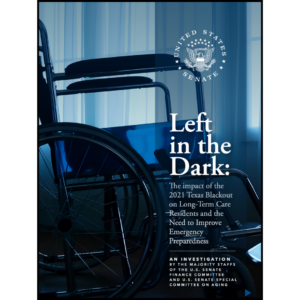4 steps to protect residents from financial fraud
Senior living operators and staff members can protect residents from financial exploitation by following “four pillars of successful intervention,” Nora Eisenhower, assistant director of the Consumer Financial Protection Bureau’s Office for Older Americans, told those participating in a Feb. 11 White House Conference on Aging webinar on elder justice.
The four steps:
- Prevent. “We all talk about prevention, and in this setting, it’s through awareness and training of…the frontline staff who are dealing with residents,” Eisenhower said. Those who work in a facility’s business, social services and admissions offices “are a critical point to preventing the fraud where it’s going to happen in a residential setting,” she added.
- Recognize. “Spot the warning signs, and take action,” Eisenhower continued. “Is there a situation where someone says they’re losing their jewelry? They’re having a problem, and it might be a small problem. You don’t think it’s a big problem. It could be a warning sign. We suggest you take action.”
- Record your findings.
- Report your findings. “Tell the appropriate authorities, and make sure you’re getting a response,” Eisenhower said.
Free guide available
 Eisenhower’s office, which she said is the only office in the federal government specifically dedicated to the financial health of consumers aged 62 or more years, has produced a 44-page guide that details these four steps and related information for senior living operators and staff members. A PDF of “Protecting residents from financial exploitation: A manual for assisted living and nursing facilities” can be downloaded at no charge, and bulk copies can be ordered online at no charge as well.
Eisenhower’s office, which she said is the only office in the federal government specifically dedicated to the financial health of consumers aged 62 or more years, has produced a 44-page guide that details these four steps and related information for senior living operators and staff members. A PDF of “Protecting residents from financial exploitation: A manual for assisted living and nursing facilities” can be downloaded at no charge, and bulk copies can be ordered online at no charge as well.
“We saw a gap in knowledge,” she said. “We heard from assisted living facilities, nursing facilities. We heard from residents. We’ve heard from family members. And the problem was that they didn’t know what to do in these settings. How is it different from living in the community? How is it different from having a financial caregiver or having an adult child take care of you? So what we really looked at was, how could we create a guide for assisted living facilities so that older adults residing in them, who become the targets of financial abuse or received threats from trusted persons, could be protected?”
The office has produced additional publications, for older consumers and those who handle their finances, too, and those guides also can be downloaded and ordered in bulk.
Effects of abuse
Elder abuse—neglect or physical, financial, sexual, emotional or psychological abuse—affects about 10 percent of older adults each year, and the fastest-growing type of abuse is financial abuse, Kathy Greenlee, assistant secretary for aging and administrator of community living for the Department of Health and Human Services, told those attending the webinar. As few as one in 44 cases of financial exploitation are reported, she added.
In addition to requiring operators and staff members to be observant, elder abuse also affects the senior living industry in a way one might not expect: increasing the odds that a resident will need more complex care. Victims of elder abuse, Greenlee said, have much higher rates of illness and premature death than adults who have not suffered abuse, and other adverse effects could include heart attack, stroke, dementia, depression, chronic diseases and psychological distress.
Elder justice is one of four themes identified for the 2015 White House Conference on Aging. A previous webinar discussed healthful aging, another of the four themes. Nora Super, the conference's executive director, said that at least two more webinars, one for each of the other two themes, retirement security and long-term services and supports, are planned as well. Regional events and a national gathering are in the works, too.
Also speaking at the webinar was Julie McEvoy, deputy associate attorney general in the Department of Justice.
More coverage of the webinar: First federal rule issued for ombudsman programs
See our other White House Conference on Aging coverage here.
I Advance Senior Care is the industry-leading source for practical, in-depth, business-building, and resident care information for owners, executives, administrators, and directors of nursing at assisted living communities, skilled nursing facilities, post-acute facilities, and continuing care retirement communities. The I Advance Senior Care editorial team and industry experts provide market analysis, strategic direction, policy commentary, clinical best-practices, business management, and technology breakthroughs.
I Advance Senior Care is part of the Institute for the Advancement of Senior Care and published by Plain-English Health Care.
Related Articles
Topics: Articles , Facility management , Finance , Risk Management











